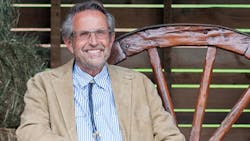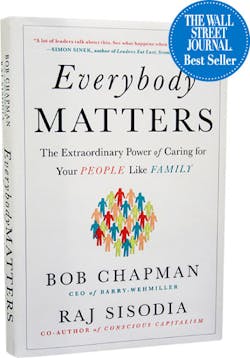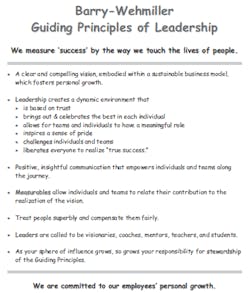A New Path to Business and Operational Excellence
Bob Chapman, chairman and CEO of Barry-Wehmiller, is turning the practice of business leadership upside down—particularly when it comes to what the business gurus dub “talent development.” He and the company leadership team have developed a fundamentally different way of leading a business, called “truly human” leadership.
“Business has always been about product and profit; it’s never been about people,” Chapman explains. “We say it’s about people, purpose and performance. It starts with the fundamental responsibility for the lives of the people that we have the privilege of inviting into our company, organized around a purpose that inspires them to share their gifts fully [and that] creates value for all stake holders to sustain us.”
Though counter-intuitive to the financially minded, Chapman’s approach works. The 140-year-old global capital equipment and engineering consulting company has leveraged it in more than 80 successful acquisitions and measures a 15.6% increase in share price trend since 1998, better than either the DJIA or S&P indices. (Barry-Wehmiller tracks private shareholder value using an Economic Value-Added formula.)
Chapman insists that it is only in hindsight that he recognized the beginning of the company’s journey toward discovering the power of people-centric leadership. As he recalls, he’d watched as a group of jovial people, who were talking, laughing and having fun in the coffee room, transformed into deflated employees as they returned to their work stations. Without thinking, he insists, in a meeting with the customer service department that followed, he proposed that the group start playing a game.
He can't explain why he proposed the game. Looking back, however, he says, "what obviously was going through my mind [was] 'why can't business be fun?'"
Meet Bob ChaThat first game was "immensely successful in building morale, fun and performance," Chapman relates. Team members began to more promptly answer phones, eagerly establish new ways of speeding customer requests and help each other meet their individual goals—all because they wanted to win. Within 12 weeks, sales were up by over 20%.
Chapman insists he didn't start out trying to invent a new leadership approach that would upend traditional thinking, or even to improve sales performance. "I didn't do it to improve performance; I had no idea how it would affect performance because I'd never done it. It was just a reaction to watching people have fun versus going to work," Chapman says. "I just wanted people to have fun at work."
Now, however, he realizes that “We aligned, coincidentally, winning the game with value creation and fun,” Chapman concludes. “For the first time in their lives, they went home every night knowing exactly how they were doing, they felt like a team, they felt individually recognized, they felt appreciated.”
As important, the success of that gamTo learn more, Chapman convened a cross-functional team to reflect on the success. In launching the meeting, he proposed an overarching vision: “We measure success by the way we touch the lives of people.” The team rallied around the vision, drafting the company’s Guiding Principles of Leadership (at right), and then later leveraging newly acquired lean practices “to weave Guiding Principles into the fabric of the organization."
A Radical Approach to Managing People
Critical to the development of Barry-Wehmiller's leadership strategy is listening. To do this, the leadership team leveraged the lean approach to continuous improvement, with one major difference. Unlike lean initiatives at other companies, Barry-Wehmiller’s was targeted to continually improving “how we [the leaders] live the principle that we put people first,” Chapman says.
Chapman and the leadership traveled among the companies’ business units, meeting with small groups of team members, and asking: “What does this [the Guiding Principles] mean to you? What are we doing that doesn’t match up to what we say here?”
We actually listen to people, and they tell us how to make things better."— Bob Chapman, chairman & CEO, Barry-Wehmiller
“We actually listen to people, and they tell us how to make things better,” he says. “We saw some dramatic opportunities to correct our behavior.” As well, he noted that the team members, having been listened to and seen leadership change their behavior accordingly, responded with even greater commitment to their jobs and the company.
Indeed, Chapman declares in the book, “If the Toyota Production Process had been studied and named properly, it would have been called ‘Listen.’"
“We see people blossom when given an opportunity, when respected, appreciated and feeling safe,” Chapman asserts. “People have unbelievable skills when you inspire them to be their best self.”
About the Author
Patricia Panchak
Patricia Panchak, Former Editor-in-Chief
Focus: Competitiveness & Public Policy
Call: 216-931-9252
Follow on Twitter: @PPanchakIW
In her commentary and reporting for IndustryWeek, Editor-in-Chief Patricia Panchak covers world-class manufacturing industry strategies, best practices and public policy issues that affect manufacturers’ competitiveness. She delivers news and analysis—and reports the trends--in tax, trade and labor policy; federal, state and local government agencies and programs; and judicial, executive and legislative actions. As well, she shares case studies about how manufacturing executives can capitalize on the latest best practices to cut costs, boost productivity and increase profits.
As editor, she directs the strategic development of all IW editorial products, including the magazine, IndustryWeek.com, research and information products, and executive conferences.
An award-winning editor, Panchak received the 2004 Jesse H. Neal Business Journalism Award for Signed Commentary and helped her staff earn the 2004 Neal Award for Subject-Related Series. She also has earned the American Business Media’s Midwest Award for Editorial Courage and Integrity.
Patricia holds bachelor’s degrees in Journalism and English from Bowling Green State University and a master’s degree in Journalism from Ohio University’s E.W. Scripps School of Journalism. She lives in Cleveland Hts., Ohio, with her family.




